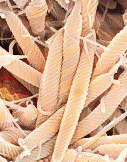Gut Function Initiative

Amanda Ramer-Tait Publications
Document Type
Article
Date of this Version
5-2009
Citation
American Journal of Pathology, (May 2009) 174(5)
doi: 10.2353/ajpath.2009.080905
Abstract
Initiation of productive immune responses against Leishmania depends on the successful transition of dendritic cells (DC) from an immature to a mature phenotype. This process is characterized by high CD40 surface expression as well as interleukin-12 production, which are frequently seen in response to L. major infection. In vivo footpad infection of C3HeB/FeJ mice for 7 days with L. amazonensis promoted an immature CD11c[1] DC phenotype characterized by both significantly low CD40 surface expression and significantly decreased interleukin-12p40 production compared with L. major infection of these same mice. In vitro infection of bone marrow-derived dendritic cells with L. amazonensis amastigotes resulted in rapid and significant phosphorylation of the mitogen activated protein kinase, extracellular signal- regulated kinase 1/2, observed within minutes of exposure to the parasite. Infection with L. amazonensis promastigotes led to increased 1/2 phosphorylation after 4 hours of infection compared with L. major infection, which correlated with promastigote transformation into amastigotes. Treatment of bone marrow-derived dendritic cells with a mitogen activated protein kinase kinase-specific inhibitor, PD98059, led to regained surface CD40 expression and interleukin- 12p40 production following L. amazonensis amastigote infection compared with non-treated, infected DC. Treatment of L. amazonensis-infected mice with the highly-specific mitogen activated protein kinase kinase inhibitor, CI-1040, enhanced surface CD40 expression on CD11c+ DC obtained from the draining lymph node. L. amazonensis amastigotes, through activation of extracellular signal-regulated kinase 1/2, inhibit the ability of DC to undergo proper maturation both in vitro and in vivo.


Comments
Copyright 2009, American Society for Investigative Pathology. Used by permission